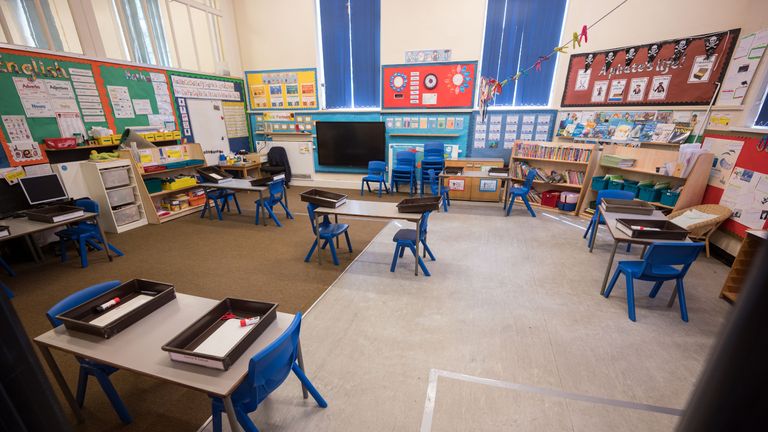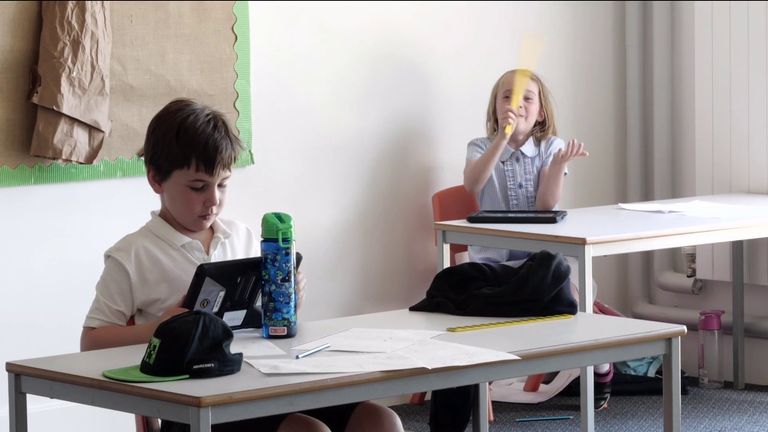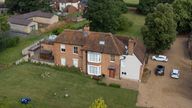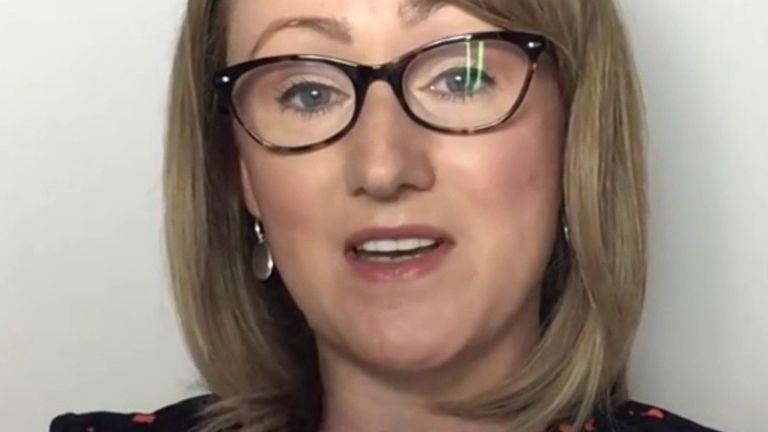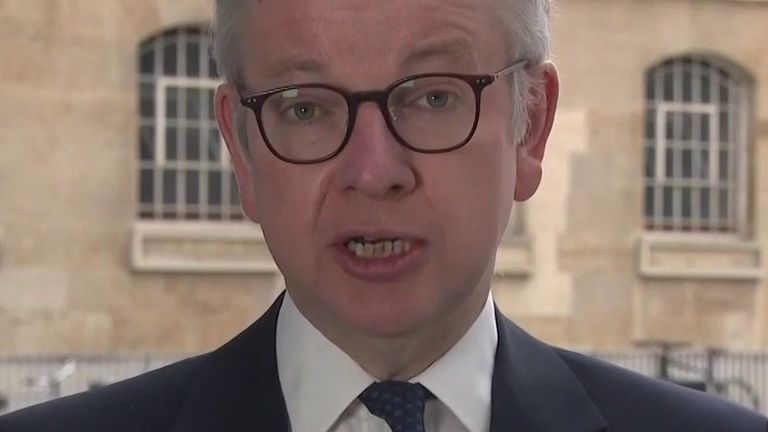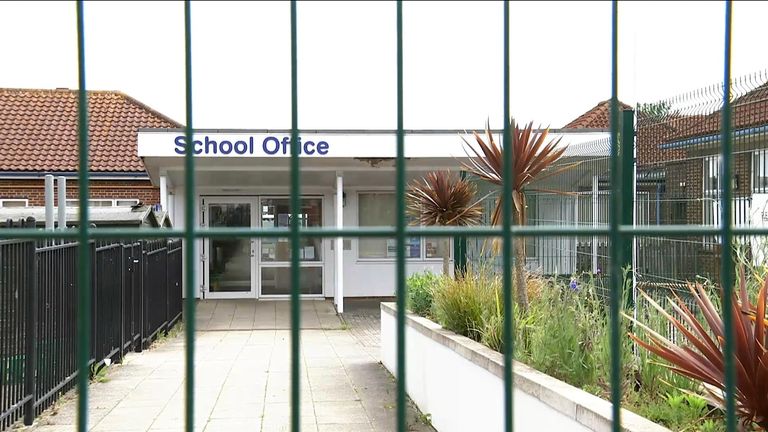Coronavirus: Effective track and trace strategy needed as schools reopen, ministers were told
Advice from the Scientific Advisory Group for Emergencies (SAGE) underpinning the government's schools stance has been published.
Friday 22 May 2020 17:49, UK
Scientific advisers to the government told ministers they should have an effective track, trace and isolate strategy as they reopen schools.
Prime Minister Boris Johnson wants schools to reopen on 1 June and there is doubt over whether such a system will be in place.
The advisers have also said that teachers do not appear to be at a greater risk of catching COVID-19 than other professions - but there is still some risk if schools reopen.
The advisers suggested some form of coronavirus testing in school takes place.
They also said that it is safe to reopen schools as long as the speed of infection, known as the R rate, is below 1 - a condition which is currently being met.
News of their advice comes as SAGE released its reasoning for how schools could be reopened safely. Key points include:
- Evidence on how likely children are to transmit the coronavirus remains "inconclusive", with a separate review of global studies led by University College London found those aged under 20 had 56% less chance of being infected
- Teachers do not appear to be more at risk of catching COVID-19 than other professions, but there is still some risk if schools reopen
- The attendance of younger teachers could be prioritised to decrease the likelihood of infection for staff in more vulnerable groups
- Wider contextual issues - like whether families have black, Asian and minority ethnic (BAME) members - has to be considered when looking at the impact of relaxing school closures on transmission of the virus
Downing Street has faced growing calls to release the science behind its move to potentially begin a phased reopening of primary schools from 1 June.
Under plans to ease the coronavirus lockdown unveiled by the PM earlier this month, children in nursery, reception, Year 1 and Year 6 will return to their classrooms.
A final decision on whether to go ahead with reopening schools is expected to be taken by the government on or before 28 May, after the most up-to-date scientific evidence has been reviewed.
Mr Johnson has promised a "world-beating" track and trace system to stop a second COVID-19 peak and help ease the lockdown will be in place by the time schools begin to reopen.
But the push to reopen schools has sparked opposition from some quarters, with more than two dozen councils saying they will not begin allowing pupils back from that date.
Unions have also expressed concerns about whether teachers, support staff and pupils will be safe.
According to a poll by the Unison union, only 2% of school staff said they felt reassured by the PM's speech and recent government guidance on reopening.
Dr Mary Bousted, joint general secretary of the National Education Union, told Sky News the plans to reopen schools were "descending into chaos".
"It was told that [1 June] was too quick, it was told that schools wouldn't have time to prepare," she said.
"The government was told that the evidence was not there that it would be safe to reopen schools. The evidence is still not there."
Adam Cooper, headteacher of Knavesmire Primary School in York, told Sky News after reading the documents: "There is a lot of information to pull out from this, but there are a lot of "maybes", "mights," "can".
"It puts you in a position of are you are confident to open, or confident not to open? You are still caught in the middle with that, I think."
:: Listen to the Daily podcast on Apple Podcasts, Google Podcasts, Spotify, Spreaker
Mr Cooper, whose school has been open for key workers of children during the outbreak, added: "I don't think what we have read today shows that schools can reopen safely.
"And that puts everyone in a really difficult position. Difficult for schools, teachers and parents, there are no winners with this really as such."
Liberal Democrat education spokesperson Layla Moran said "serious questions" had to be asked about "why it took so long for this to be made public".
"The delay has caused unnecessary stress to parents and teachers and left schools answering questions in the dark," she said.
A former government chief scientific adviser has said 1 June is "too early" for schools to reopen.
Sir David King, who has convened a separate "independent" panel of scientists, has said delaying this by two weeks until 15 June "approximately halves the risk to children".
Although a number of councils have expressed opposition to the potential reopening of schools, many are not under local authority control.
Academies, state schools that are not run by councils, could take their own decisions on whether to follow the government's plans.
A number of chief executives of academy chains have said schools have to reopen soon in order to avoid "irreparable" damage to vulnerable children.
The chief executive of REAch2, the largest primary academy chain in England, has said it plans to reopen all its schools for the priority year groups identified by the PM.
A Department for Education spokesperson said: "The evidence published today shows we looked at a range of options in drawing up this phased approach to reopening schools, which is in line with the Government's overall 'roadmap'.
"As in other countries across Europe, the first phases of the wider opening of schools will prioritise younger children. Advice from SAGE shows there is a lower overall risk from opening schools and nurseries to younger children, and that they are less likely to become unwell if infected with coronavirus compared to adults.
"This cautious, phased approach for allowing a limited number of pupils back into classrooms has been, and will continue to be, informed by the best possible scientific and medical advice."
The devolved nations have taken a different approach to schools than Westminster.
In Scotland, the plan is to have all children back on a part-time basis on 11 August.
In Northern Ireland, the aim is to restart classes for all children in September if enough progress has been made in tackling COVID-19.
Meanwhile, in Wales, the government has not given any dates for when the country can expect schools to reopen.
